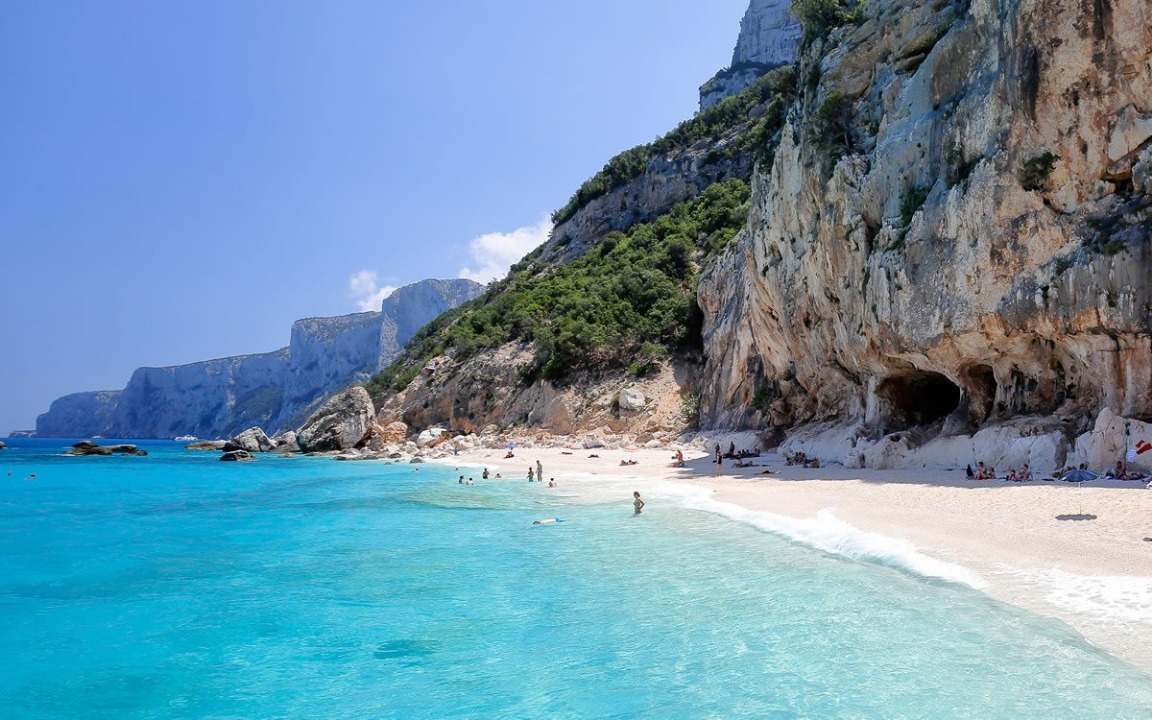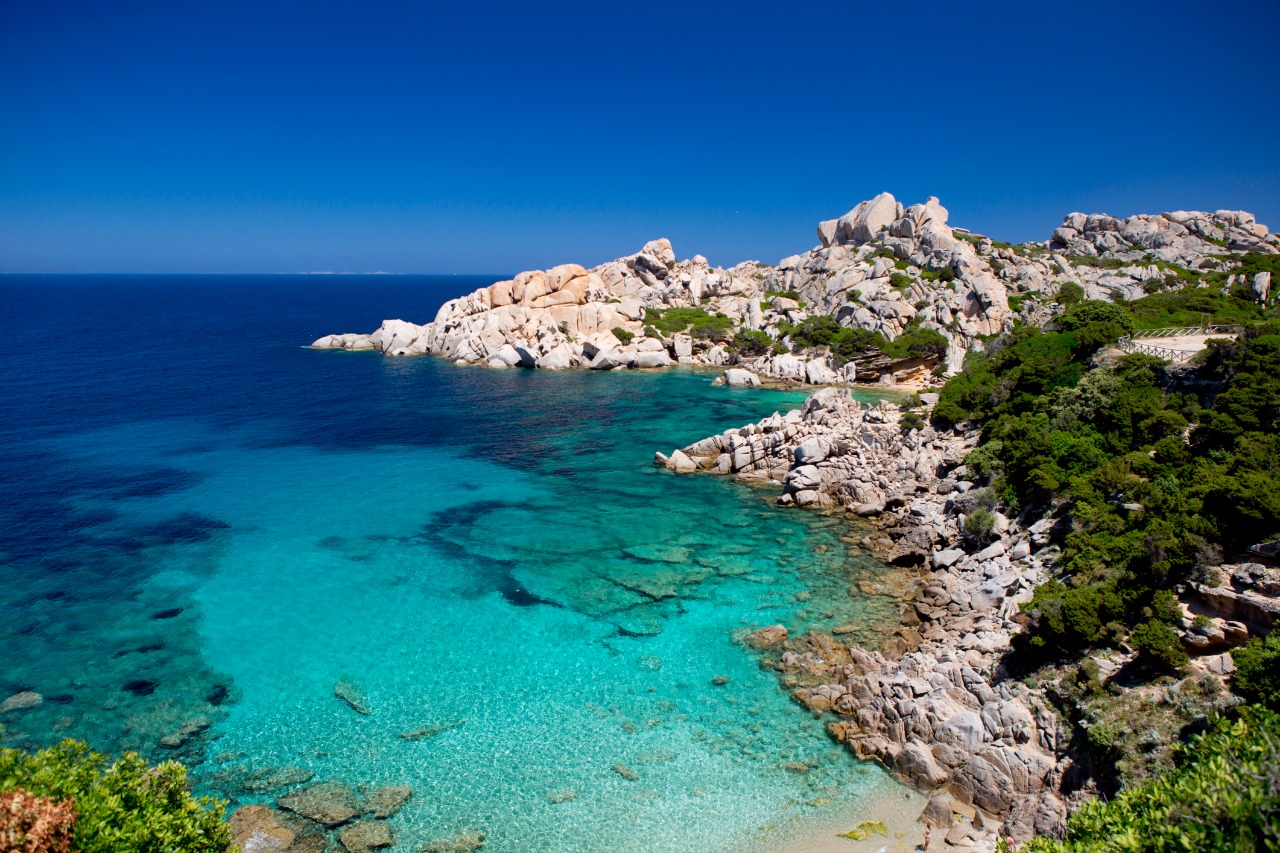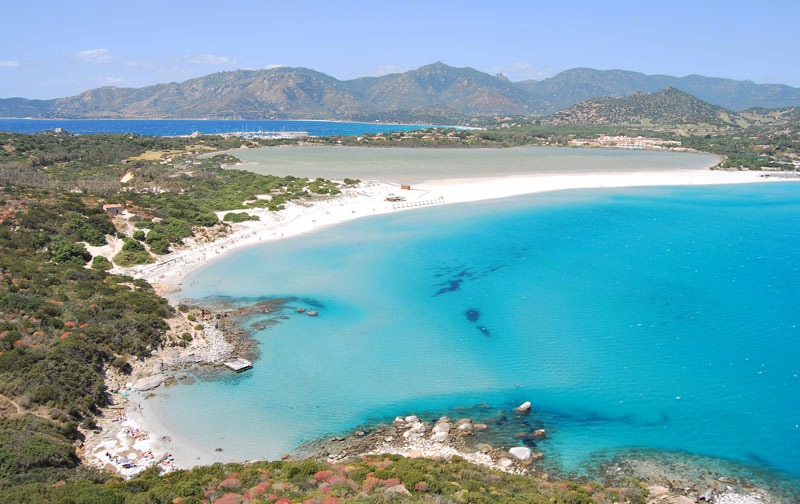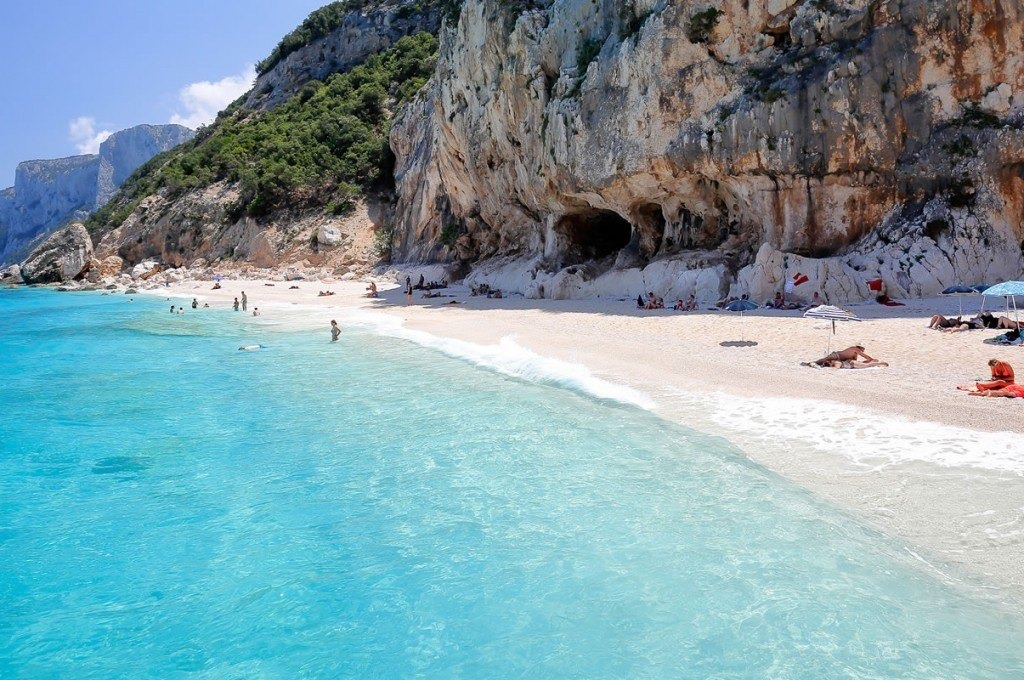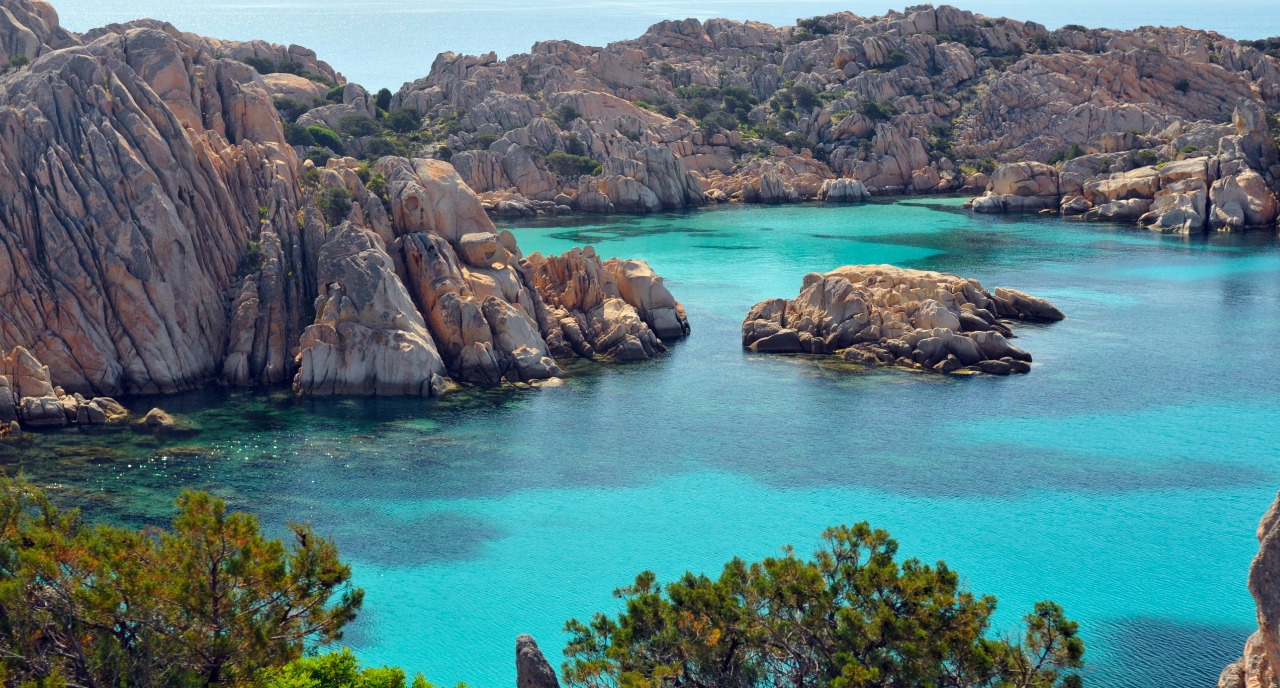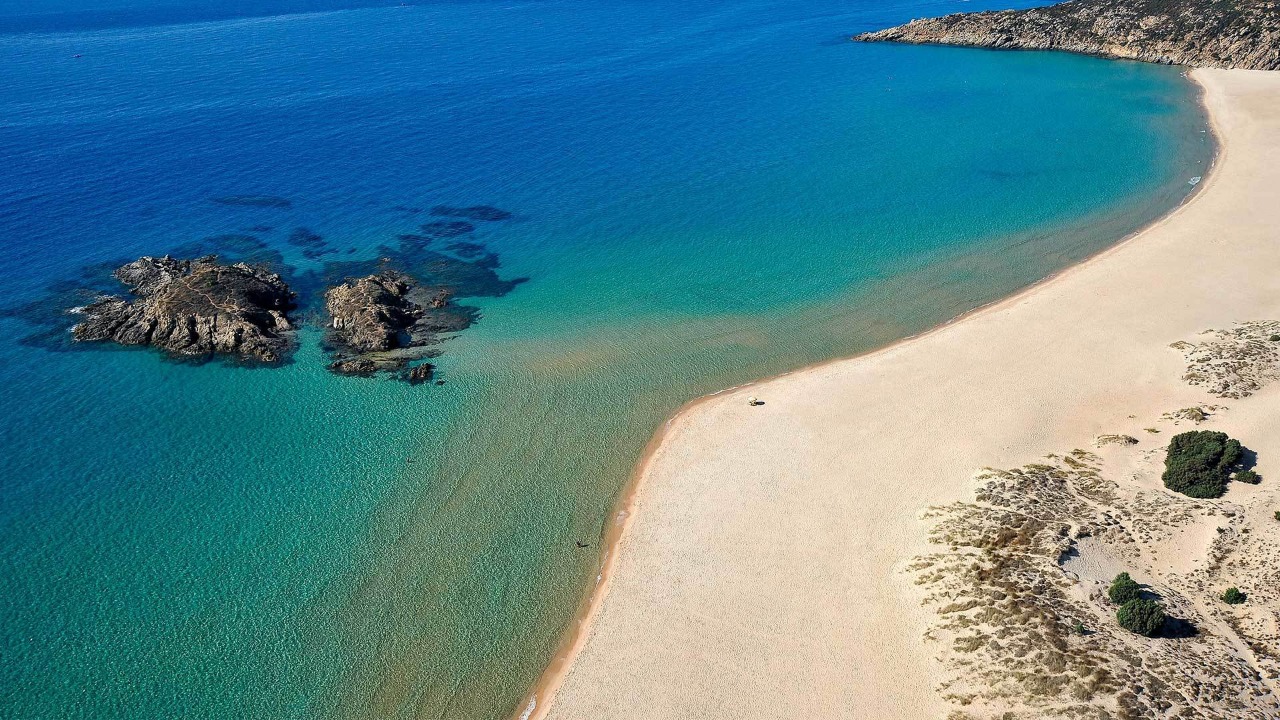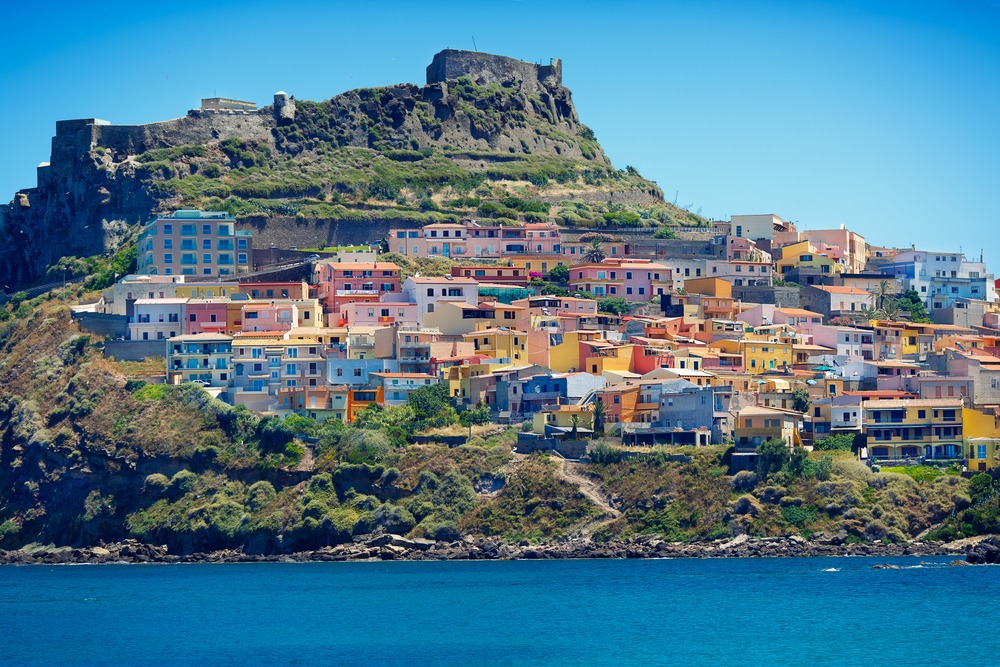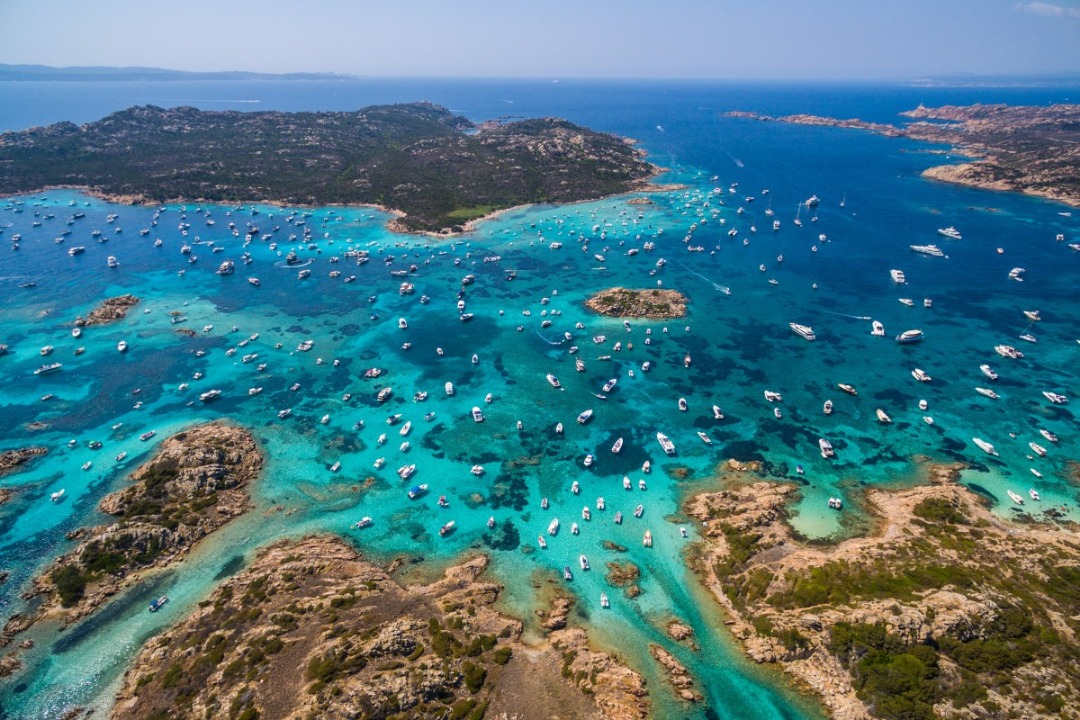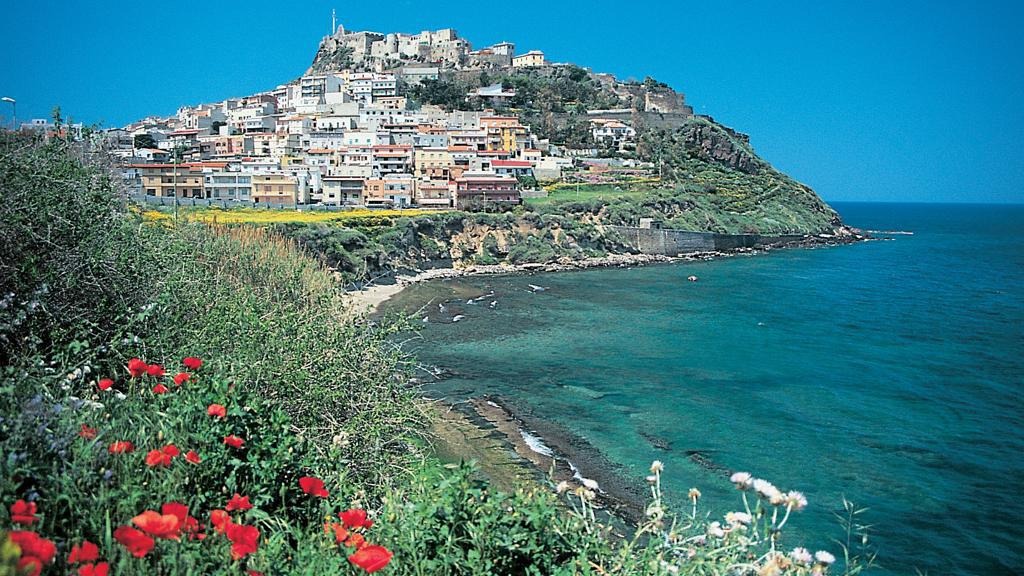Pictures of: Sardinia
Location map
Airports
Hotels and other Accommodation
Golf Courses
What to visit
Where to Eat
World Nomads
The Travel Insurance with the largest coverage

The Travel Insurance with the largest coverage

Sardinia
Sardinia is an island in the western Mediterranean Sea and an autonomous region of southern Italy, with an area of 24 090 km², 1.65 million inhabitants and whose capital is Cagliari.
Situated west of the Italic peninsula, south of Corsica and north of Tunisia, it has been administratively since 28 February 1948 an autonomous region with special status; along with Veneto, is one of two regions whose status in the region describes locals with the expression popolo (people), expression devoid of any legal significance or legal recognition of differences with other Italian citizens.
Situated west of the Italic peninsula, south of Corsica and north of Tunisia, it has been administratively since 28 February 1948 an autonomous region with special status; along with Veneto, is one of two regions whose status in the region describes locals with the expression popolo (people), expression devoid of any legal significance or legal recognition of differences with other Italian citizens.
Tourism
Sardinia, with about 1,900 km of coastline, is one of the most popular beach lovers' destinations, the island is famous for its particularly beautiful waters and beaches, and the coasts are rugged rocky, interspersed with wonderful beaches of fine sand and coves. countless.
The shores of Sardinia are a succession of white sandy beaches alternated with rocky areas always bathed by a crystal clear sea that has nothing to envy to tropical seas. Tourism is one of the most important economic activities on the island.
Sardinia is also interesting for its history, its traditions and its cuisine, there are archaeological remains of the nuragic, Phoenician and Roman period, Romanesque churches, castles and observation towers along the coast.
Sardinia has a lot to do: stunning beaches, clear waters, ancient fortress cities, prehistoric ruins and tourist resorts. The Sardinian coast is sublime, the beaches are Sardinia's main attractions, while the interior of the island is mountainous and excellent for walking and hiking.
The megalithic Tombe dei Giganti are very ancient and peculiar remains of the prehistoric and proto-historical eras, as in Arzachena (Li Lolghi and Lu Coddhu Ecchju) and Dorgali (S'Ena and Thomes); the domus dejanas (witches' houses), tombs dug in the rock as in Corongiu, Sant'Andrea Priu and Filigosa; and the nuraghi.
The nuraghi, huge stone castles and fortified dwellings of the first inhabitants, numbering about 7,000 can be found all over the island. The most interesting are Barumini (Su Nuraxi di Barumini, a UNESCO World Heritage Site since 1997), Abbasanta (Nuraghe Losa), Dorgali (Sierra Orrios), Torralba (Nuraghe Santu Antine) and Orroli (Nuraghe Arrubiu) .
Phoenician and Roman remains are in Tharros, Nora, Carbonia (Mount Sirai), Sant'Antioco (Sulci), Cuglieri (Cornus), Fluminimaggiore (Temple of Antas), Bolotana (Fort Punico de Mularza Noa o Pabude) and Genoni (Monte Sant Antine); there are Roman relics in Porto Torres (Roman City, Roman Bridge), Fertilia (Roman Bridge), Porto Conte (Roman Villa), Fordongianus (Trajan's Forum, Roman City) and Cagliari (Roman Amphitheater, Villa di Tigellio, Tuvixeddu Necropolis) .
The early Christian period is represented by the Paleo Christian church of San Giovanni de Sinis (6th century). From the eleventh century appeared the Giudicati, this was also a period of ascension of art, culture and religion in Sardinia, as exemplified by the magnificent Romanesque churches built from the tenth century, with their impressive paintings and stunning architecture. From the tenth century, over the next 200 years, about 70 churches were built across the island, most of them in the countryside, far from urban centers. The most interesting are Santa Trinita di Saccargia, San Gavino in Porto Torres, Nostra Signora di Tergu, Santa Maria di Ardara, Santa Giusta cathedral in Santa Giusta, Santa Maria in Trattalias, Sant'Antioco di Bisarcio, San Pietro in Sorres, San Pietro in Zuri, Santa Maria in Uta, San Simplicio in Olbia and San Lorenzo di Silanus.
The island contains numerous extraordinary tourist areas including the Emerald Coast, the Maddalena Archipelago, the Gulf of Orosei and Gennargentu area, Costa Rei, Sinis, Asinara Island, Green Coast.
The shores of Sardinia are a succession of white sandy beaches alternated with rocky areas always bathed by a crystal clear sea that has nothing to envy to tropical seas. Tourism is one of the most important economic activities on the island.
Sardinia is also interesting for its history, its traditions and its cuisine, there are archaeological remains of the nuragic, Phoenician and Roman period, Romanesque churches, castles and observation towers along the coast.
Sardinia has a lot to do: stunning beaches, clear waters, ancient fortress cities, prehistoric ruins and tourist resorts. The Sardinian coast is sublime, the beaches are Sardinia's main attractions, while the interior of the island is mountainous and excellent for walking and hiking.
The megalithic Tombe dei Giganti are very ancient and peculiar remains of the prehistoric and proto-historical eras, as in Arzachena (Li Lolghi and Lu Coddhu Ecchju) and Dorgali (S'Ena and Thomes); the domus dejanas (witches' houses), tombs dug in the rock as in Corongiu, Sant'Andrea Priu and Filigosa; and the nuraghi.
The nuraghi, huge stone castles and fortified dwellings of the first inhabitants, numbering about 7,000 can be found all over the island. The most interesting are Barumini (Su Nuraxi di Barumini, a UNESCO World Heritage Site since 1997), Abbasanta (Nuraghe Losa), Dorgali (Sierra Orrios), Torralba (Nuraghe Santu Antine) and Orroli (Nuraghe Arrubiu) .
Phoenician and Roman remains are in Tharros, Nora, Carbonia (Mount Sirai), Sant'Antioco (Sulci), Cuglieri (Cornus), Fluminimaggiore (Temple of Antas), Bolotana (Fort Punico de Mularza Noa o Pabude) and Genoni (Monte Sant Antine); there are Roman relics in Porto Torres (Roman City, Roman Bridge), Fertilia (Roman Bridge), Porto Conte (Roman Villa), Fordongianus (Trajan's Forum, Roman City) and Cagliari (Roman Amphitheater, Villa di Tigellio, Tuvixeddu Necropolis) .
The early Christian period is represented by the Paleo Christian church of San Giovanni de Sinis (6th century). From the eleventh century appeared the Giudicati, this was also a period of ascension of art, culture and religion in Sardinia, as exemplified by the magnificent Romanesque churches built from the tenth century, with their impressive paintings and stunning architecture. From the tenth century, over the next 200 years, about 70 churches were built across the island, most of them in the countryside, far from urban centers. The most interesting are Santa Trinita di Saccargia, San Gavino in Porto Torres, Nostra Signora di Tergu, Santa Maria di Ardara, Santa Giusta cathedral in Santa Giusta, Santa Maria in Trattalias, Sant'Antioco di Bisarcio, San Pietro in Sorres, San Pietro in Zuri, Santa Maria in Uta, San Simplicio in Olbia and San Lorenzo di Silanus.
The island contains numerous extraordinary tourist areas including the Emerald Coast, the Maddalena Archipelago, the Gulf of Orosei and Gennargentu area, Costa Rei, Sinis, Asinara Island, Green Coast.
Gastronomy
Surrounded by clear emerald waters, the island of Sardinia is the furthest from mainland Italy - 200 kilometers. Fertile mountains and plains take turns in the landscape, interspersed with rivers and streams. Throughout history it was colonized by Byzantines, Arabs and Catalans who left their mark on local cuisine.
The region's specialties are based on the cuisine of shepherds and peasants from the interior of the island, as well as the abundance by the sea.
It is common, therefore, to find roast suckling pig, boar skewers, rustic boiled wild vegetables and, on the other hand, seafood, mullets (which provide the coveted bottarga) and sardines, which can be eaten with such delicacy. skin and pimples. In orchards grow cherries, figs, lemons, pomegranates and plums. In vegetable gardens, artichokes, tomatoes, celery, radishes and eggplants. Everything is so tasty and fresh that it requires no complex spices and sauces.
To measure the size of the strength of Sardinian countryside, it is good to know that about half of the island is used as pasture land. One third of Italy's sheep herds live in Sardinia and grazing is the main source of income for the inhabitants. Linked to this activity, the dairy industry is also significant. Sardinian pecorino is one of the most appreciated cheeses - on the island and on the mainland.
The region's specialties are based on the cuisine of shepherds and peasants from the interior of the island, as well as the abundance by the sea.
It is common, therefore, to find roast suckling pig, boar skewers, rustic boiled wild vegetables and, on the other hand, seafood, mullets (which provide the coveted bottarga) and sardines, which can be eaten with such delicacy. skin and pimples. In orchards grow cherries, figs, lemons, pomegranates and plums. In vegetable gardens, artichokes, tomatoes, celery, radishes and eggplants. Everything is so tasty and fresh that it requires no complex spices and sauces.
To measure the size of the strength of Sardinian countryside, it is good to know that about half of the island is used as pasture land. One third of Italy's sheep herds live in Sardinia and grazing is the main source of income for the inhabitants. Linked to this activity, the dairy industry is also significant. Sardinian pecorino is one of the most appreciated cheeses - on the island and on the mainland.
Weather
Sardinia is an island that has an island climate in the Mediterranean, the climate is hot and dry during the summer and very humid in the winter months, with an average annual temperature of around 17ºC. The temperature in Sardinia, as a rule, does not drop to extremes in winter, but it may snow in some areas, but is not common.
The weather in Sardinia is not bad, the colder months are from December to February, when temperatures generally range from 7 to 15 ° C at this time of year. However, in the highlands of the island, the temperature may be lower during this period.
Sardinia is an island of heavy rainfall, rain in Sardinia is also felt in the fall season, although spring rains are very common, as well as in winter where they are stronger. In summer, they are practically nonexistent.
Snow falls as a general rule only above 500 meters in the Gennargentu area, an area where snow is present for about four or five months a year. The Marghine Mountains are also a typical place to find snow, especially in the Monte di Ala area and the Limbara area where snow is often found.
Sardinia is also known as the island of wind by wind Mistral, which comes from the northwest. In summer, the winds cause the abundant vegetation to dry out, especially since they are winds from Africa. The winds from the east are usually warmer from the southern Mediterranean.
Sea temperatures during the months of January to March rarely drop below 13ºC, while the warmest months are from June to September.
The weather in Sardinia is not bad, the colder months are from December to February, when temperatures generally range from 7 to 15 ° C at this time of year. However, in the highlands of the island, the temperature may be lower during this period.
Sardinia is an island of heavy rainfall, rain in Sardinia is also felt in the fall season, although spring rains are very common, as well as in winter where they are stronger. In summer, they are practically nonexistent.
Snow falls as a general rule only above 500 meters in the Gennargentu area, an area where snow is present for about four or five months a year. The Marghine Mountains are also a typical place to find snow, especially in the Monte di Ala area and the Limbara area where snow is often found.
Sardinia is also known as the island of wind by wind Mistral, which comes from the northwest. In summer, the winds cause the abundant vegetation to dry out, especially since they are winds from Africa. The winds from the east are usually warmer from the southern Mediterranean.
Sea temperatures during the months of January to March rarely drop below 13ºC, while the warmest months are from June to September.
Other tourist destinations in:
Italy
Italy
Other world tourist destinations
Why to book with BOOK HOTEL LISBOA
The best prices
Our partnerships with the world´s largest operators offer research on the best market prices.
More options
At Rotas Turisticos you can book the hotel, buy the air ticket, book the transfer from the airport to the hotel and vice versa, book the local excursions, rent the car, take travel insurance and consult the places to visit and where to go.
Holiday Tips & Destinations
Hundreds of holiday destinations with all the options that allow you to easily choose the destination that best suits your dream vacation.
BOOK HOTEL LISBOA
Links

